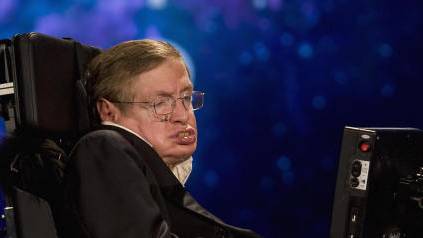London 2012 Paralympics opening ceremony: "Enlightenment"
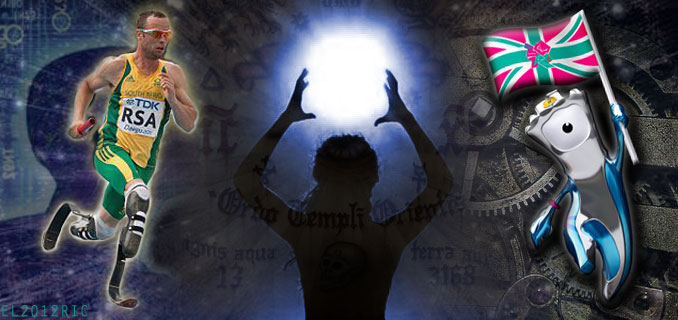
 The Paralympic Games return to their country of origin directly on the heels of the bombastic Olympic production in London this year.
The Paralympic Games return to their country of origin directly on the heels of the bombastic Olympic production in London this year.To begin Wednesday, August 29, the paralympic games are set to inspire a generation. But this time instead of a theme of Britain’s past as highlighted in ceremonies surrounding the historical industrial revolution and the heydays of rock music gone by, the paralympic games will be focused on the future.
The theme of the games is "Enlightenment", as outlined by co-artistic directors Jenny Sealey and Bradley Hemmings.
Helen Russell of MetroBlogs writes:
There is the usual secrecy surrounding the event but Sealey and Hemmings have released a few details to whet our appetites. The cast will include over 3,000 adult volunteers, 100 child volunteers and over 100 professional performers. In addition 50 performers, including injured members of the armed forces, will perform circus skills including static trapeze, rope and pole work.
[...]
The title ‘Enlightenment’ brings together the historic with the present and, like Boyle’s extravaganza, will highlight how people have transformed society through struggles for freedom, democracy and equality – from the emergence of the Enlightenment movement, which championed reason in the 17th and 18th centuries to the modern day where disability equality is legislated for in the new Equality Act.
The Enlightenment movement challenged superstition and intolerance including the prevalent ideas that disability was linked to evil and witchcraft. The opening ceremony will be part of a continuing journey of disability equality where people’s current perceptions of disability will be challenged.
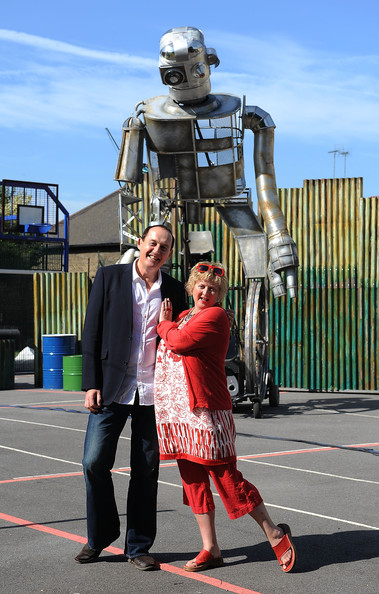
Bradley Hemmings and Jenny Sealey MBE pose for the camera with a Giant Iron Man on the set of Iron Man at the Greenwich and Docklands Festival in St Alfege Park on June 24, 2011 in London, England after they are announced by LOCOG as the Artistic Directors for the Paralympic Games Opening Ceremony.
Also known as the Paralympic Anthem, the Paralympic Hymn is played when the Paralympic Flag is raised. It is a musical piece, "Hymn de lAvenir" (en. "Anthem of the Future") composed by Thierry Darnis. The anthem was approved by the IPC in March 1996. (YouTube)
The Illuminated Ones
"The Age of Enlightenment (or simply the Enlightenment or Age of Reason) was a cultural movement of intellectuals in 18th century Europe and the American colonies. Its purpose was to reform society using reason (rather than tradition) and advance knowledge through science. It promoted science and intellectual interchange and opposed superstition, intolerance and abuses by church and state."
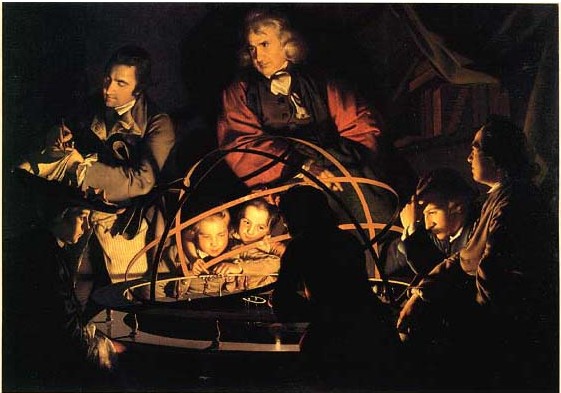
"Scientific experiments like the one pictured here were offered as fascinating shows to the public in the mid-eighteenth century. In Joseph Wright of Derby’s painting A Philosopher Giving A Lecture at the Orrery (1765), we see the demonstration of an Orrery, a mechanical model of the solar system that was used to demonstrate the motions of the planets around the sun—making the universe seem almost like a clock. " Source
While the Age of Enlightenment put emphasis on liberty, democracy, critical thought, and religious tolerance, it was not an utopia by any stretch. There existed powerful rulers of the period, so called "enlightened despots" who welcomed leaders of the Enlightenment at court where they designed laws and programs to reform the system as Enlightenment Absolutists.
Often, when a system is forcefully rejected, the resulting new dynamic can be equally as zealous. The resulting vacuum of power was filled by new bodies of control, such as secret societies like the Freemasons, and the Order of the Illuminati.
AmericanAtheists.com writes:
And too, the Enlightenment was a feverish period of Atheistic thought and propaganda. Many of the leading philosophers of the time were Atheists or deists, opposed to the cultural and political hegemony long exercised by the Vatican and its shock troops, the Jesuits. Much of the political, social and literary activity of the Enlightenment was characterized by a repudiation of Christianity, and the formulation of doctrines calling for separation, if not outright abolition, of state and church.
It was no coincidence that these groups, products of their time, would ’enlighten’, and ’illuminate’. These terms described the push to discovery, understanding, education, new technologies and sciences - all coming to light, and filled not with the brilliance of God but with the luminous consciousness of humanity and the human mind.
Now, the "Enlightenment" of new humans is what may be the agenda for the 2012 Paralympic games.
The Fastest Man On No Legs
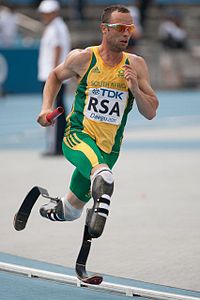 Olympic games for the disabled is not new, the first games organized in Stoke Mandeville Hospital in Aylesbury, England, in 1948. However 2102 in particular has highlighted how technology and science has created a ’new man’ that challenges the old concepts of disabilities and the limits of the body.
Olympic games for the disabled is not new, the first games organized in Stoke Mandeville Hospital in Aylesbury, England, in 1948. However 2102 in particular has highlighted how technology and science has created a ’new man’ that challenges the old concepts of disabilities and the limits of the body.This year, the Olympics featured Oscar Pistorius, a runner born without natural legs. Dubbed ’Bladerunner’, (describing the profile of his synthetic legs, but also a reference to the concept of ’organic robots’ in Ridley Scott’s ’Blade Runner’ movie) Pistorious will be flag-bearer for the opening ceremony of the 2012 Paralympics.
In 2007 he took part in international competitions for able-bodied athletes, spurring controversy and generating claims that his artificial legs gave him an unfair advantage, and he was ruled ineligible. A year later, on the strength of new findings, a court ruling enabled him to participate, and "Pistorius became the first double leg amputee to participate in the Olympics when he entered the men’s 400 metres race and was part of South Africa’s 4 × 400 metres relay team."
Transhumanity
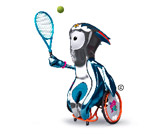 Some wonder if the technological advances that are quickly becoming a great ’equalizer’ between the abled and the disabled, will soon slinghot those with artificial augmentations into the forefront, creating a cyborg future.
Some wonder if the technological advances that are quickly becoming a great ’equalizer’ between the abled and the disabled, will soon slinghot those with artificial augmentations into the forefront, creating a cyborg future.In an article entitled "Transhumanism and Sports", one blogger poses questions as to what these types of advancements might mean for the future of sport, as well as humanity itself.
In short, he wonders:
How do we decide if somebody is too much of a robot to compete with "normal" people?
If robotically-enhanced athletes are banned from normal competition, will we see the emergence of parallel leagues?
If robotically-enhanced athletes are allowed to compete in normal competition, will we see a rise in elective amputation?
When (not "if") robot limbs are "better" than real ones, it may become common for people to seek robotic replacement for "normal" limbs - especially as they age - so if this enhancement is acceptable in the general population, why would athletes be any different? Will we require/expect our athletes to be the only ones without robot limbs? And why would anyone care how fast an Olympian can run if the average robot-legged citizen can run faster?
To directly highlight the role that modern science is playing in the 2012 Paralympics, notable theoretical physicist and author Stephen Hawking is rumored to be part of the opening ceremonies.
Efforts to shroud the spectacle in secrecy were scuppered after performers heard the scientist’s computerised voice during rehearsals, reported the Mirror.
It is hoped the 70-year-old cosmologist will be present at the Olympic Stadium, though due to Hawking’s ill health there has been speculation that he may just appear on the big screen.
In 1985 the scientist caught pneumonia which damaged his vocal chords and left him unable to speak.
Although Hawking is English, his synthesised voice sounds slightly American, as his distinctive voice is provided by synthesiser company Speech +.
Paralympic Struggle, Celebration of Humanity
For the majority, human disabilities are neither as glamorous as the media projects, nor as easily ’fixed’ by technology as the scientific community might suggest.
The athletes that compete in the 2012 Paralymics in London must struggle past societal roadblocks as well as mental and physical ones. History has not been kind to those with disabilities, and it’s clear that even though in time technology might enable handicapped people to overcome their physical disabilities, humanity at large must also adjust to cast off the stigma still attached to being disabled.
Megan Abrams writes:
The October 20, 2010 episode of Survivor: Nicaragua featured the elimination of Kelly Bruno, a 26-year-old medical student from North Carolina. Although she was good at challenges and helped with work around her tribe’s camp, she was voted off for one simple reason. Kelly is a below-the-knee amputee. In their on-camera interviews and during their conversations around camp, several of Kelly’s tribe mates were heard saying that they needed to get rid of her because no one wanted to go to the finals with "a charity case." They figured that the members of the jury would give Kelly the million dollars because they felt sorry for all that she’d been through in her life.
Kelly currently holds two world records for amputees in distance running, won gold at the NY Triathlon and is only the second amputee to finish the Hawaii Ironman. Clearly, there is no need to feel sorry for her. So why did her tribe mates say as much on national television? Because of the stigma that still follows people with disabilities.
Disability often carries a stigma that many people don’t want to be associated with. People with disabilities, whether from birth or acquired later in life through injury or illness, are often marked as being weak, fragile and unable to do even the simplest things for themselves. As in the case of Kelly Bruno, other people may see those with disabilities as objects of pity or people to be looked down upon.
In 2012, the London Paralympic Games are tribute and testimony to the reality that disabilities are not always something to be ’fixed’, but something that makes a person different yet equal. However, there’s no doubt that the face of sports (and humanity) will change as science, medicine, and technology advance. The Neo-Enlightenment may well present itself in the form of transhumanism.
It’s imperative that we ensure the transition is measured and carefully executed, for all our sakes.
Helen Russell concludes:
"Hopefully the opening ceremony will be more than a show – it will transform people’s preconceived ideas about what it means to be disabled and show that, due to disability rights campaigns, Britain has moved from a nation that once systematically institutionalised disabled people to a country where disabled people can overcome huge societal barriers to become world-class athletes."
Art co-director Hemmings said in May “Jenny and I want our ceremony to be both spectacular and deeply human.”
“The Paralympic ceremony is going to be a fantastic event but we don’t want to spoil the surprise.”
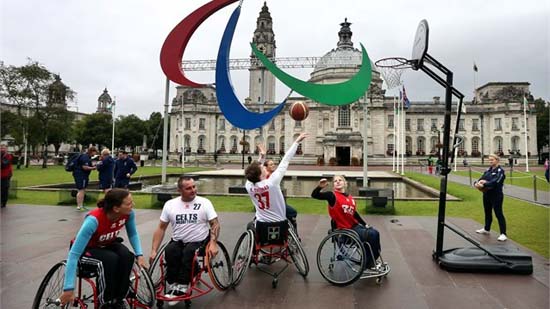
Cardiff Celts Wheelchair Basketball team: The giant Paralympic Agitos have been launched ahead of the start of the Paralympic Games on 29 August.
By Elizabeth Leafloor, RedIceCreations.com
Source Articles:
Stephen Hawking To Appear In Opening Ceremony For London 2012 Paralympics
The Enlightenment, Freemasonry, and The Illuminati
Wikipedia - Age of Enlightenment
Article: Transhumanism and Sports
Wikipedia - Oscar Pistorius
Article: The Stigma of Disability
London 2012: The First Transhuman Games?
Grampa, what was "walking"?
